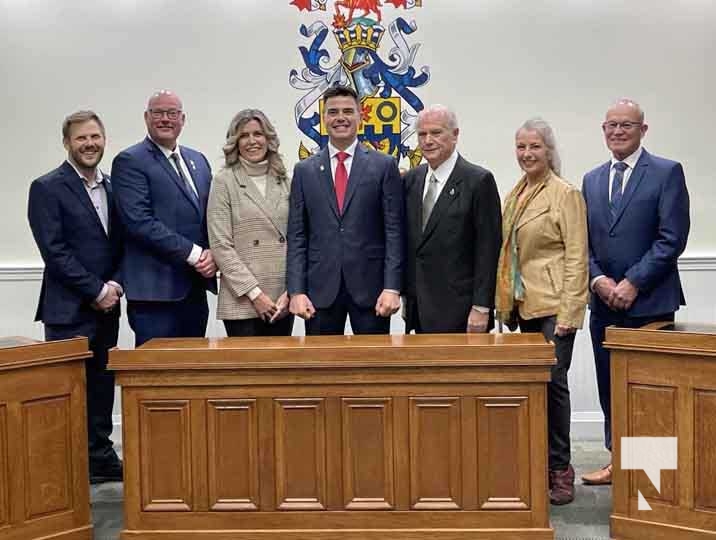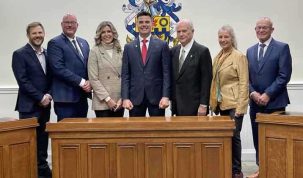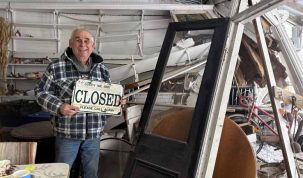By Cecilia Nasmith/Today’s Northumberland
The long list of delegations that seem to be taking up literally hours out of each Cobourg council meeting – Monday night, for example, the first two hours out of a meeting that went nearly five hours was taken up by seven delegations – might be a sign that a new idea is needed.
Councillor Adam Bureau came up with one – the town hall meeting.
Bureau called for a series of town hall sessions in which citizens can put their questions and concerns directly to members of council. Following lengthy debate, council voted to refer the idea to the municipal governance review that will bring a report to council in June.
The motion was inspired by former councillor Theresa Rickerby’s taking council to task for failing to live up to the commitments it made when, in January 2021, it signed a declaration to join the Coalition of Inclusive Municipalities.
Perhaps no one is more directly affected by the town’s lack of commitment to diversity and inclusion than its most vulnerable, Rickerby said, pointing out that three community members were lost to drug poisoning in the last two weeks.
She pointed out that the Canadian Human Rights Code defines substance dependence as a disability, and that no one can be targeted based upon their association or relationship with anyone facing discrimination.
Which brought her to the town’s treatment of the homeless.
Rickerby was disturbed by the December 2022 incident when volunteers in a church warming room were ordered to remove sleeping mats, even though Girl Guides and McGill University students had used that same space for overnight stays.
She also decried the lock-up of the downtown bus shelter, which she said amounts to putting certain Cobourg citizens at risk for the sake of other Cobourg citizens.
Rickerby closed with an invitation to all members of the community to attend the April 30 Community Healing Circle and Indigenous Ceremony in Victoria Park at the Lions Pavilion. The gathering starts at 1 p.m. and the ceremony at 2 p.m.
She also called on councillors to commit to taking the Harm Reduction Training being offered by Peterborough AIDS Resource Network. The Downtown Business Improvement Area is taking such training, she said, and perhaps council could partner in this effort.
A motion to this effect passed readily, but Bureau’s motion to establish some kind of consistent framework in which town hall meetings might be held took much fine tuning before it would pass.
His original motion called for three town hall meetings this year, with the intention of making them a quarterly affair. There are so many issues people want to talk about, he said, and council meetings are stretching out longer and longer.
“This may alleviate that and bring us closer together with the public, rather than being just in council chambers,” he said.
Bureau visualized such a session patterned after the one recently held at the Lions’ Centre by Cobourg Police Chief Paul VandeGraaf.
Deputy Mayor Nicole Beatty – chairing the meeting in the absence of Mayor Lucas Cleveland – hesitated to call a meeting where no established protocol is enshrined in any municipal bylaw.
Besides, she said, she and other councillors already have established different forums for informal public consultation in the form of coffee breaks, open-door policies or drop-in hours.
Councillor Randy Barber hated the whole idea, period.
“I have an e-mail. I have a phone. I am at all council meetings, and I am dealing with things all the time,” Barber groused.
“And why there seems to be this requirement to have public meetings where people can come and talk to us about God knows what, with absolutely no preparation for any of us to have any answers.
“I simply don’t understand how that makes us better at our job. We would simply be referring many of these things back to staff. We do the same thing at committee-of-the-whole,” he declared.
Both Barber and Councillor Brian Darling were put off by being faced with Bureau’s motion without prior notification. Darling pointed out that quick action in response to a delegation is not always preferable to thoughtful deliberation.
Beatty made a motion to refer the possibility of town hall meetings to the municipal governance review, which passed unanimously – including support from Bureau.
“I think our first responsibility is to listen to the public That is our whole job, and to make educated decisions on things. As long as this process gets moving, I am okay with that,” he stated.
In the later discussion that incorporated this element into the review that has been launched, Barber had one more request.
“I do have a problem with a town hall meeting that does not have an agenda, that does not have one or two things we are going to discuss, as opposed to a wide-open bring-whatever-you-want-to-talk-about,” he said.
“And with one or two subjects on the agenda, it affects the staff, as opposed to you-never-know-what-you-are-going-to-get, so you have to have all the staff there.”





















